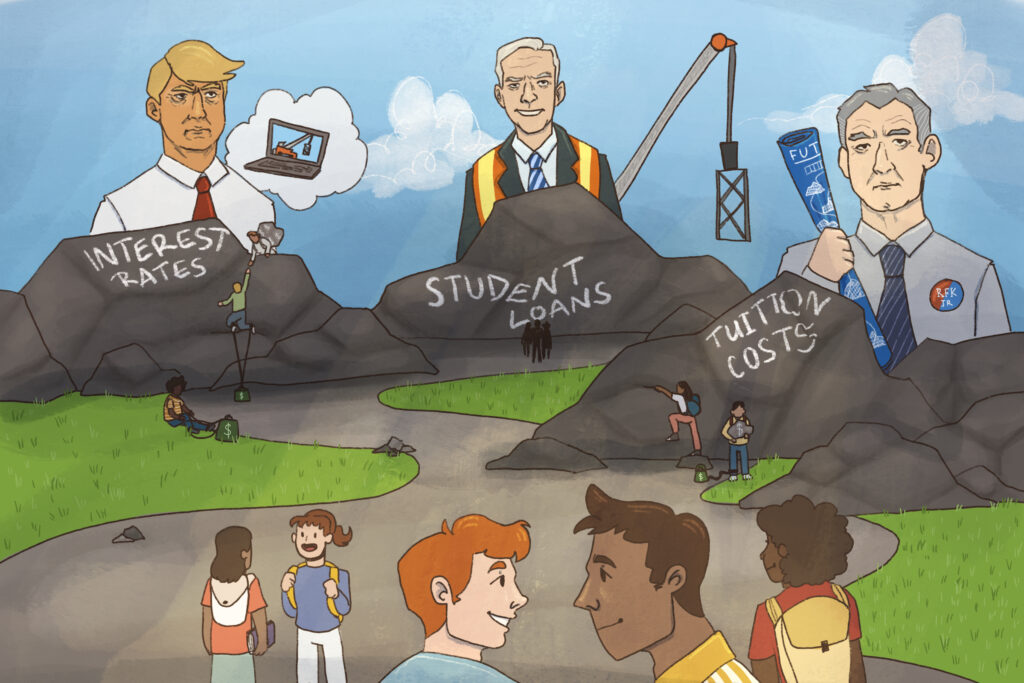The issue of higher education affordability has become a hot topic as the 2024 presidential election approaches. Presumed Democratic nominee Joe Biden, presumed Republican nominee Donald Trump and independent candidate Robert F. Kennedy Jr. have each proposed plans to address the worsening student loan crisis.
In his latest budget proposal, Biden aims to prioritize affordable higher education, reduce the cost of college and ease the burden of student debt. The budget includes $12 billion for a College Cost Reduction Fund to lower costs through initiatives such as the Classroom to Career Fund for job-related dual enrollment. The budget proposal also eliminates loan origination fees and increases the maximum Pell Grant amount by $100 to help 7.2 million students, further expanding the availability of Pell Grants following a recent $900 increase.
The plan would make community college free through federal and state collaboration, subsidize two years of education at Historically Black Colleges and Universities, Tribally Serving Colleges and Universities, and Minority Serving Institutions for families earning less than $125,000 a year, and increase funding for research infrastructure at these institutions, while providing $1.4 billion for the National Science Foundation's STEM Workforce Program, which focuses on diversity, equity, and inclusion, to improve equity.
On April 8, President Biden visited Madison, Wisconsin, where he announced his student loan debt relief plan, which aims to forgive widespread student loan debt.
“For working-class and middle-class people, the ability to repay student loans has become so burdensome that many are unable to pay them off until decades after they leave school,” Biden said. “Even if you work hard and pay off your student loans, your debt will only grow, not decrease.”
The centerpiece of Biden's announcement was a new student loan forgiveness plan that aims to forgive up to $20,000 in unpaid interest for about 23 million low- and moderate-income borrowers in income-contingent repayment plans, including single borrowers making up to $120,000 a year and married borrowers making up to $240,000 a year.
The Department of Education plans to use data it has to automatically provide interest-forgiveness relief to millions of borrowers who have let interest accumulate for years and ballooned loan balances despite making payments, so no application is required. The plan builds on Biden administration efforts such as the SAVE Plan, which helps prevent the capitalization of future interest and has forgiven interest for 4.5 million borrowers so far.
Biden has also proposed additional efforts to lower education costs and expand free access to community college, including providing tuition assistance to families earning less than $125,000 a year and creating a $12 billion “College Cost Reduction Fund” that would create a $7.2 billion program to match grants to states that offer at least 12 credits of free career-oriented higher education programs.
Trump has been a vocal critic of widespread student loan debt forgiveness, and during a campaign rally in June 2023, he celebrated the U.S. Supreme Court's rejection of Biden's plan to forgive up to $20,000 in debt for millions of borrowers.
“Today, the Supreme Court ruled that President Biden cannot cancel hundreds of billions of dollars, possibly trillions of dollars, of student loan debt,” Trump said, “which would have been deeply unfair to the millions of people who worked hard and diligently paid off their debt.”
Additionally, Trump's Department of Education delayed thousands of debtor-advocate claims during his term, allowing defrauded students to seek loan forgiveness. Trump also proposed eliminating the Public Service Loan Forgiveness program, which gives eligible public servants who have made repayments for 10 years a path to forgiveness.
Kennedy Jr., a presidential candidate from Michigan, aims to ease the burden of student loans by advocating legislation to allow refinancing at lower interest rates and eliminate interest on all student loans. He also supports expanding funding and opportunities for vocational-based educational programs such as electrical, plumbing and auto repair as an alternative to traditional four-year degrees. In 2021, the No Interest Student Loan Act, which Kennedy supported, was defeated after Congress did not approve it. Kennedy Jr.'s campaign holds universities, not banks, responsible for student loans and encourages higher education institutions to lower tuition prices.
In an interview with The Michigan Daily, LSA sophomore Jacob Corian said he believes Biden will offer the most efficient higher education plan.
“Given the effectiveness of what we're doing and the life we're living right now, I think what will be most effective and most beneficial for us is Biden's plan for tuition assistance and student loan forgiveness,” Corian said. “It's about making sure students can go to school and not have to incur debt afterward.”
Corian said he was interested in why university tuition fees have become so high and what the government can do to effectively address the issue.
“The government needs to take a hard look at why college tuition is so expensive and what it can effectively do about it,” Corian said. “Providing debt relief through the government, Faster or other relevant organizations is not necessarily the best solution, but it is certainly a short-term solution.”
Daily Staff Reporter Sophia Mottola can be contacted at Email:.

